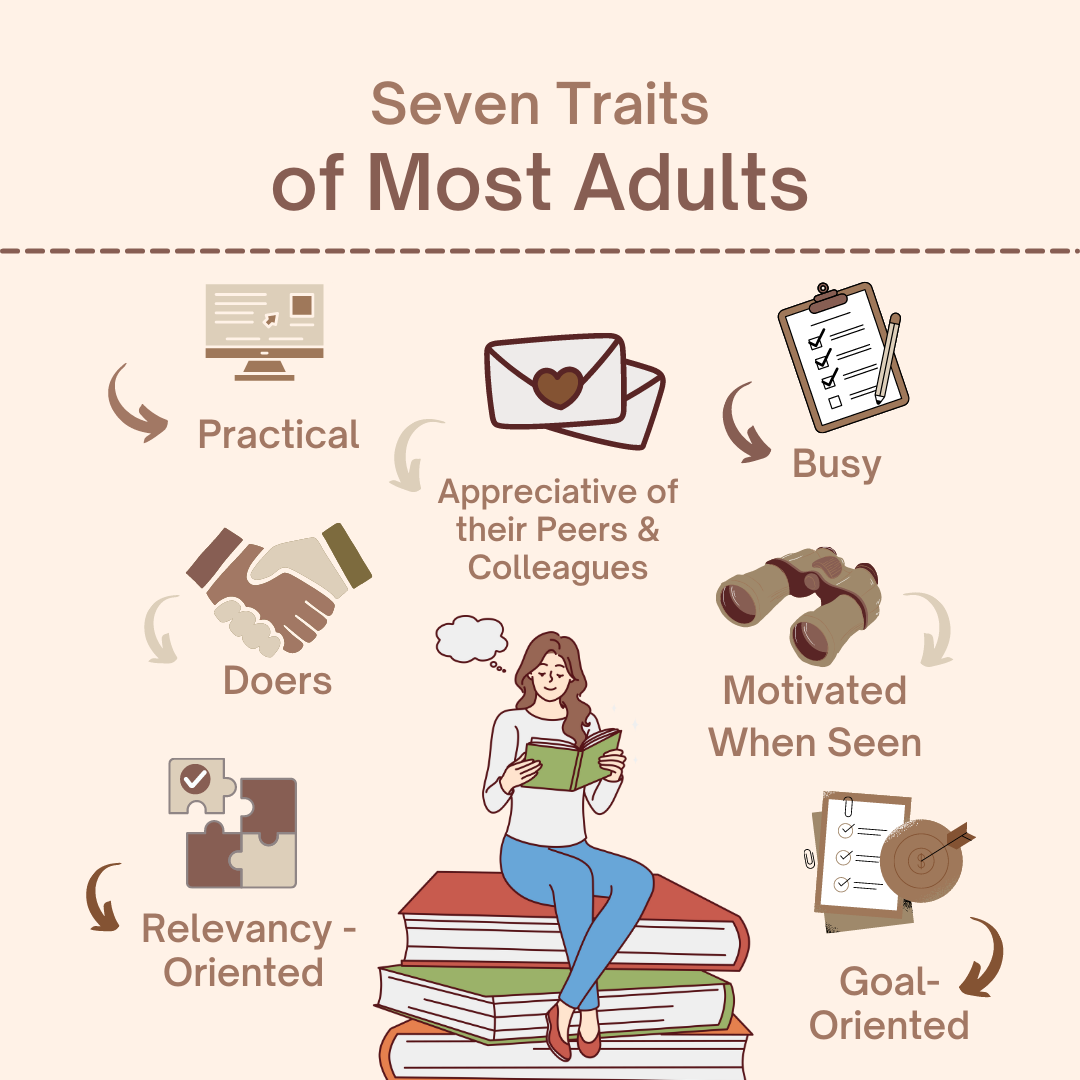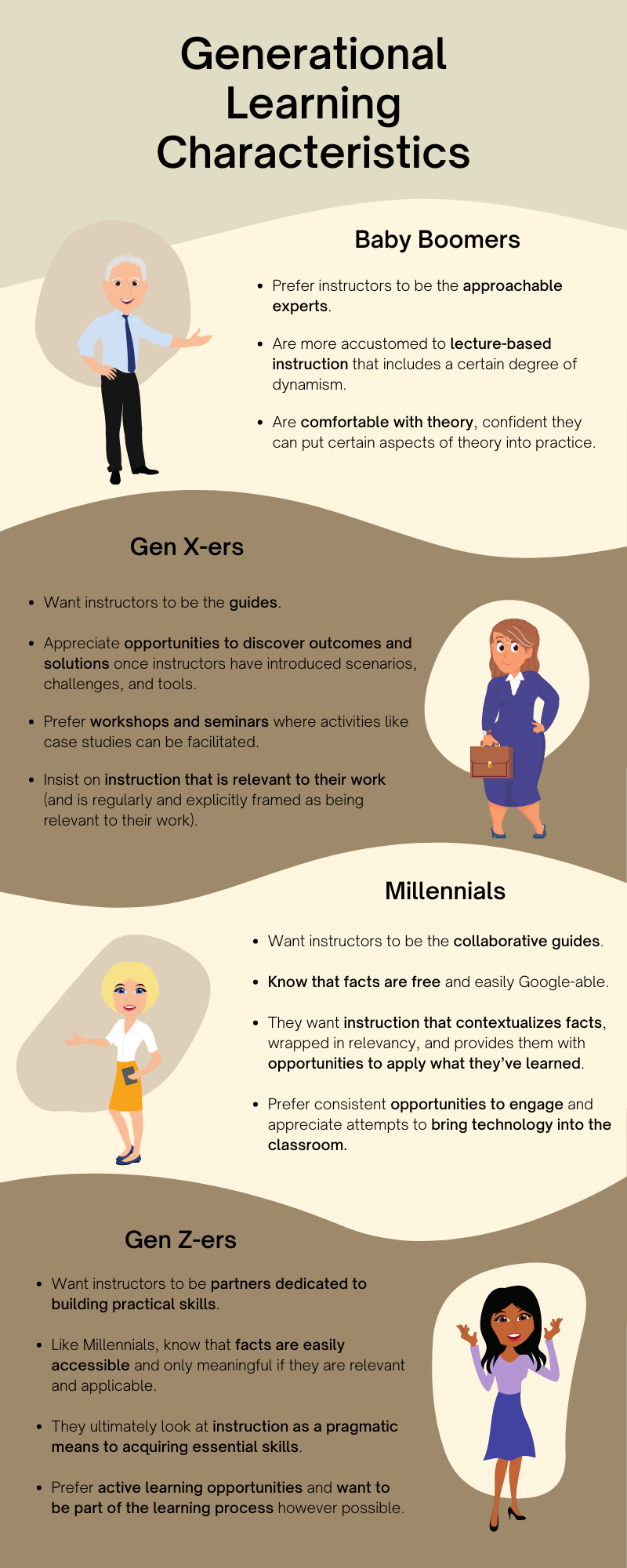
Understanding Adult Learners
In Intro to Adult Education, we established some key tenants of adult learning theory to get at how adults learn and why they seek our educational opportunities. In this section, we address who adult learners are.
In broad terms, most adults are
practical, looking for instruction that they can directly apply to their profession.
goal-oriented, seeking out educational opportunities that will help them achieve a pragmatic objective (e.g., filling a skill gap for their current position, building new skills to qualify for a promotion).
relevancy-oriented, feeling grounded when instruction is anchored in their industry, profession, and responsibilities.
busy, likely to prioritize education after personal and professional responsibilities are met, making timing and length of instruction critical.
doers, learning through experience (and absent that opportunity, learning when through instructor-facilitated examples)
motivated when seen, feeling respected when their wealth of knowledge and experience is acknowledged within instruction.
appreciative of their peers and colleagues, valuing opportunities to network and inspired when instructors recognize their work as a community of practitioners.
When divided into generational subgroups, other learning preferences emerge. It should be noted, however, that what follows are broad generalizations and that adult educators almost always teach across generations. As such, instructors should consider employing multiple instructional modalities in each session to reach as broad of an audience as possible.
Baby Boomers
want instructors to be the approachable experts (Lynch, 2015).
are more accustomed to lecture-based instruction that includes a certain degree of dynamism (e.g., participation, reflection, feedback; Panopto, 2017).
are comfortable with theory, confident they can put certain aspects of theory into practice.
Gen X-ers
want instructors to be the guides (Lynch, 2015), appreciating opportunities to discover outcomes and solutions once instructors have introduced scenarios, challenges, and tools.
value some lecture but prefer workshops and seminars where activities like case studies can be facilitated (SeamsCloud, n.d.).
insist on instruction that is relevant to their work and is regularly and explicitly framed as being relevant to their work (Wiley University Services, 2022).
Millennials
want instructors to be the collaborative guides (Lynch, 2015), seeing themselves as constructing learning and learning opportunities alongside their instructors.
know that facts are free and easily Google-able. They want instruction that contextualizes facts, wrapped in relevancy, and provides them with opportunities to apply what they’ve learned.
prefer consistent opportunities to engage and appreciate attempts to bring technology into the classroom (Wiley University Services, 2022).
Gen Z-ers
want instructors to be partners dedicated to building practical skills.
like Millennials, know that facts are easily accessible and only meaningful if they are relevant and applicable, but ultimately look at instruction as a pragmatic means to aquiring essential skills.
prefer active learning opportunities and want to be part of the learning process however possible.
Brendza, C. (2016). Learning theories — Which is best for Millennials? TTC Innovations. https://ttcinnovations.com/learning-theories-which-is-best-for-millennials/
Lynch, A. (2015). Generational learning styles. Generational edge. http://www.generationaledge.com/blog/posts/generational-learning-styles
Panopto. (2017, May). Are you ready to support 4 generations of learners? https://www.panopto.com/blog/are-you-ready-to-support-4-generations-of-learners/
SeamsCloud. (n.d.). How do generations learn differently — Gen X. https://www.seamscloud.com/how-do-generations-learn-differently/
Wiley University Services. (2022). Meeting different generational needs for a strong adult learner experience. https://universityservices.wiley.com/meeting-different-generational-needs-for-a-strong-adult-learner-experience/


